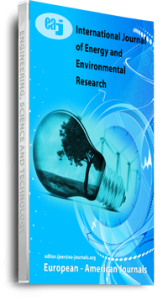Compressed Air Energy Storage (CAES) is a technology for storing large quantities of electrical energy in the form of high-pressure air. CAES can play a major role in meeting the challenge of making renewable energy more reliable and in the successful integration of energy generated from renewable energy into the electric grid. A thermodynamic analysis of Diabatic and Advanced Adiabatic Compressed Air Energy Storage systems under the ambient temperature, compression and expansion ratios and stages number of compression and expansion trains is conducted in this paper. This paper aims to study the impact of these parameters on the specific work as well as the efficiency of the D-CAES and AA-CAES systems. In addition, a comparison between the obtained results of D-CAES and AA-CAES systems is carried out.
Keywords: AA-CAES, D-CAES, ambient temperature, compression and expansion ratios, round-trip efficiency.

